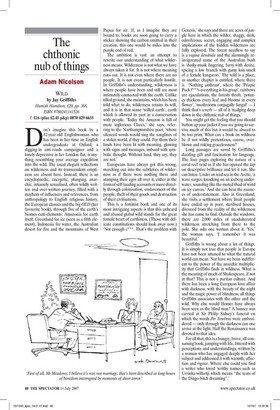The chthonic nub of things
Adam Nicolson WILD by Jay Griffiths Hamish Hamilton, £20, pp. 368, ISBN 9780241141526 £16 (plus £2.45 p&p) 0870 429 6655 Don't imagine this book by a 42-year-old Englishwoman who has been in her time an English undergraduate at Oxford, a digging-in anti-roads campaigner and a lonely depressive in her London flat, is anything resembling your average expedition into the wild. The usual elegant reflections on wilderness and its transcendent emptiness are absent here. Instead, there is an encyclopaedic, energetic, plunging, anarchic, intensely sexualised, often wildly written and over-written journey, filled with a mayhem of influences and references, from anthropology to English religious history, the European classics and the big OED (her favourite book), through five of the earth's biomes-cum-elements: Amazonia for earth itself, Greenland for ice (seen as a fifth element), Indonesia for water, the Australian desert for fire and the mountains of West Papua for air. If, as I imagine they are bound to, books are soon going to carry a sticker showing the carbon emitted in their creation, this one would be miles into the purple end of red.
The ambition is vast: an attempt to rewrite our understanding of what wilderness means. Wilderness is not what we have always taken it for. It is not where meaning runs out. It is not even where there are no people. It is not even particularly hostile. In Griffiths's understanding, wilderness is where people have been and still are most intimately connected with the earth. Unlike tilled ground, she maintains, which has been told what to do, wilderness retains its will, and it is in that sense 'willed earth', earth which is allowed its part in a conversation with people. 'Today the Amazon is full of mute inglorious Clares,' she says, referring to the Northamptonshire poet, 'whose silenced words would sing the songlines of a stolen world, if they could. For them their lands have been lit with meaning, glowing with signs and messages, imbued with symbolic thought. Without land, they say, they are not.'
Europeans have always got this wrong, marching out into the subtleties of wilderness as if there were nothing there and stamping their egos all over it, either in the form of self-lauding accounts or more directly through colonisation, enslavement of the people, theft of their goods and destruction of their civilisations.
This is a feminist book and one of its most intriguing aspects is that this unheard and abused global wild stands for the great female heart of earthiness. (Those with delicate constitutions should look away now.) 'Not enough c***. That's the problem with Genesis,' she says and there are acres of jungle here in which the wilder, shaggy, dark, odoriferous, secret, engaging and complex implications of the hidden wilderness are fully explored. The forest needless to say is a vagina dendrida and the alarmingly reinvigorated name of the Australian bush is 'dusky-musk lingering, furry with desire, spicing a low branch with gamy loin-smell of a female kangaroo.' The wild is a place, as another chapter is entitled, where there is 'Nothing unthrust', where the 'Priapic Puck f***s everything in his grasp', rainbows are ejaculations, the forests throb, 'potency thickens every leaf and blooms in every flower', 'mushrooms conjugally fungal' — I think that's a verb — all of it 'nudging deep down in the chthonic nub of things.'
You might get the feeling that you should button up your jacket if you are going to survive much of this but it would be absurd to be too prim. What can a book on wildness be if not wildly pretentious, coarse, overblown and risking gracelessness?
Long passages are saved by Griffiths's dazzling gift and fascination for language. The four pages exploring the nature of a coral reef read as if she has opened the tap on descriptive brilliance and let it run. She can listen. Under an iced sea in the Arctic, 'a wave surges, knocking on an iceberg underwater, sounding like the muted thud of wind on icy canvas.' And she can hear the nuances of understatement. Also in Greenland, she visits a settlement where Inuit people have ended up in poor, sterilised houses, divorced from the reality of the wilderness she has come to find. Outside the windows, there are 2,000 miles of unadulterated wilderness stretching from there to the pole. She asks one woman about it. 'Yes: the woman says, 'I remember it was beautiful.'
Griffiths is wrong about a lot of things. It is simply not true that people in Europe have not been attuned to what the natural world can mean. Nor have we been indifferent to the power of the anarchic multiplicity that Griffiths finds in wildness. What is the meaning of much of Shakespeare, if not in that? This is not a puritan culture. And there has been a long European love affair with darkness, with the beauty of the night and the magic power of blindness, all things Griffiths associates with the other and the wild. Why else would Homer have always been seen as the blind man? A banner was carried at Sir Philip Sidney's funeral on which the words Per Tenebras were embroidered — only through the darkness can one arrive at the light. Half the Renaissance was devoted to that idea.
For all that, this is a hungry, brave, all-con- suming book, jumping with life, littered with perceptions and understandings, written by a woman who has engaged deeply with her subject and addressed it with warmth, affec- tion and vigour. Where else could you find a writer who loved `writhy names such as Urrinka-willartji which means "the teats of the Dingo-bitch dreaming":

















































 Previous page
Previous page